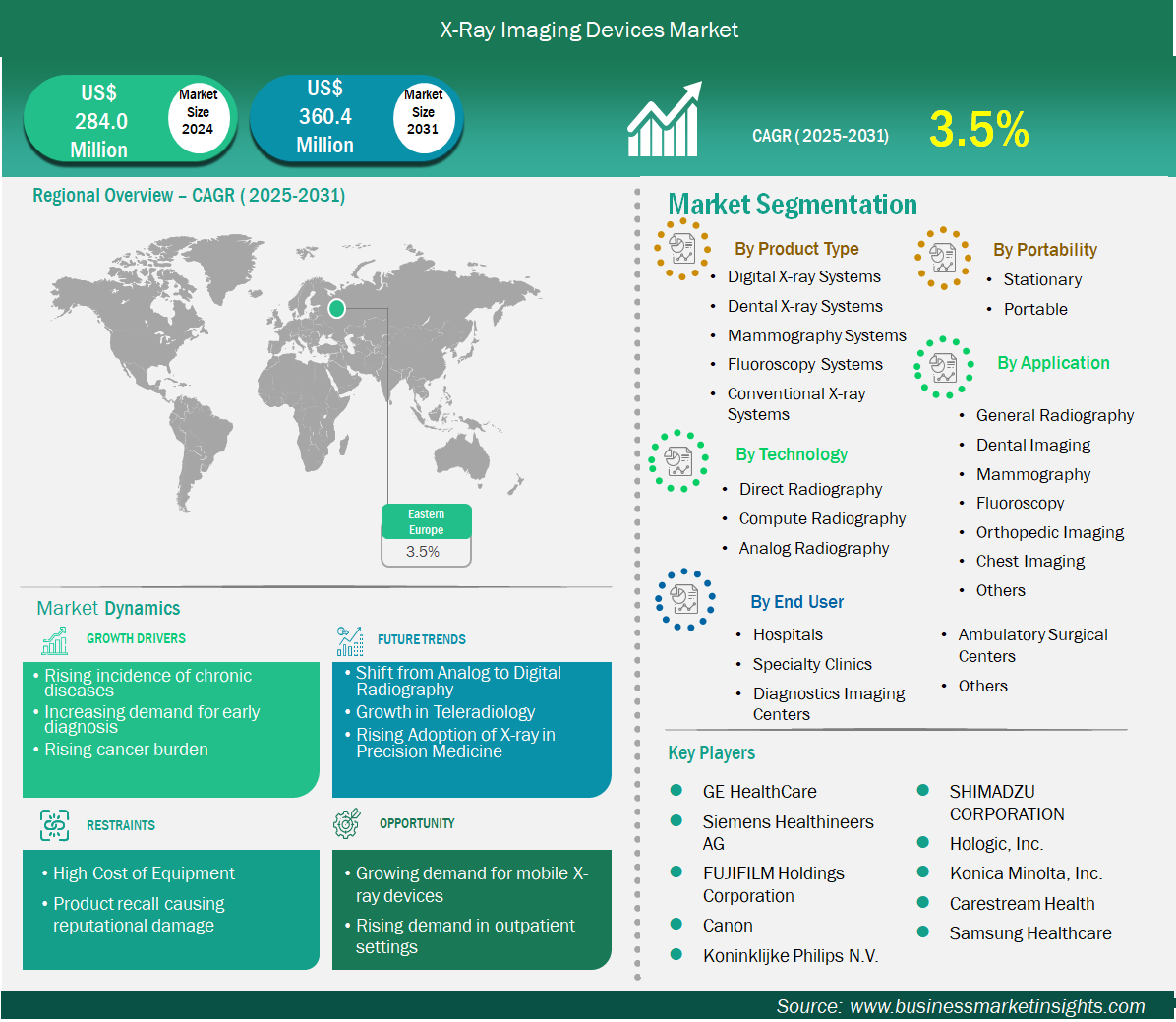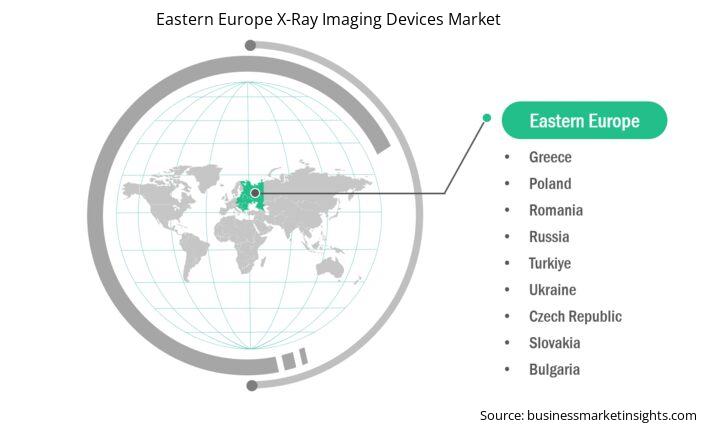The Eastern Europe X-ray imaging devices market size is expected to reach US$ 360.4 million by 2031 from US$ 284.0 million in 2024. The market is estimated to record a CAGR of 3.5% from 2025 to 2031.
The Eastern Europe X-Ray imaging devices market is facing a dramatic change, spurred by continuous healthcare reforms and an effort to modernize outdated medical facilities. Although the region depended on older analog systems, there is a strong leaning towards adopting digital radiography (DR) and computed radiography (CR) technologies. The market growth is further catalyzed by the need for enhanced diagnostic effectiveness, increased workflow efficiency, and improved patient outcomes. Therefore, the implementation of sophisticated X-ray systems is irregular, with an evident contrast between more affluent urban centers and less-developed rural areas. This presents a unique market dynamic, with a simultaneous demand for both high-end, technologically sophisticated equipment and more affordable, robust systems.

Key segments that contributed to the derivation of the X-ray imaging devices market analysis are product type, portability, technology, application, and end user.
The continuous focus on combating the high prevalence of chronic diseases in the region serves as the key driver of this market. Cardiovascular diseases, respiratory diseases, and cancers are major public health concerns and require the provisions of a strong and accessible diagnostic imaging infrastructure. Eastern European governments respond to the need for national health programs for early disease diagnosis and better treatment by pressing directly for upgrading diagnostic equipment. Higher imaging from these public health programs forms a potential growth stimulus for the market. This push to upgrade diagnostic capabilities is a core component of broader national health strategies, distinguishing this market from others where drivers may be more commercially focused.
Based on country, the Eastern Europe X-ray imaging devices market is further segmented into Russia, Poland, Romania, Czech Republic, Ukraine, Greece, Slovakia, and Bulgaria. Russia held the largest share in 2024.
Russia is the largest market for X-ray imaging devices in Eastern Europe. The country's size, large population, and significant government-led healthcare initiatives make it a pivotal market. The Russian government has been the major promoter of modernization, and large procurement programs have aimed to equip public hospitals and clinics with modern medical technology. There is a strong domestic manufacturing base, though international players maintain a significant presence, especially in the high-tech segments. Even with import substitution gaining popularity, the government is still pushing local producers of X-ray equipment and thereby providing them with financial and regulatory support. This unique dynamic creates a competitive environment where foreign companies must navigate a complex regulatory and commercial landscape to gain a foothold.
| Report Attribute | Details |
|---|---|
| Market size in 2024 | US$ 284.0 Million |
| Market Size by 2031 | US$ 360.4 Million |
| CAGR (2025 - 2031) | 3.5% |
| Historical Data | 2021-2023 |
| Forecast period | 2025-2031 |
| Segments Covered |
By Product Type
|
| Regions and Countries Covered |
Eastern Europe
|
| Market leaders and key company profiles |
|
GE HealthCare, Siemens Healthineers AG, FUJIFILM Holdings Corporation, Canon Inc., Koninklijke Philips N.V., SHIMADZU CORPORATION, Hologic, Inc., Konica Minolta, Inc., Carestream Health, and Samsung Healthcare are among the key players operating in the market. These players adopt strategies such as expansion, product innovation, and mergers and acquisitions to stay competitive in the market and offer innovative products to their consumers.
The following methodology has been followed for the collection and analysis of data presented in this report:
The research process begins with comprehensive secondary research, utilizing both internal and external sources to gather qualitative and quantitative data for each market. Commonly referenced secondary research sources include, but are not limited to:
Note: All financial data included in the Company Profiles section has been standardized to US$. For companies reporting in other currencies, figures have been converted to US$ using the relevant exchange rates for the corresponding year.
Business Market Insights conducts a significant number of primary interviews each year with industry stakeholders and experts to validate and analyze the data and gain valuable insights. These research interviews are designed to:
Primary research is conducted via email interactions and telephone interviews with industry experts across various markets, categories, segments, and sub-segments in different regions. Participants typically include:

The Eastern Europe X-Ray Imaging Devices Market is valued at US$ 284.0 Million in 2024, it is projected to reach US$ 360.4 Million by 2031.
As per our report Eastern Europe X-Ray Imaging Devices Market, the market size is valued at US$ 284.0 Million in 2024, projecting it to reach US$ 360.4 Million by 2031. This translates to a CAGR of approximately 3.5% during the forecast period.
The Eastern Europe X-Ray Imaging Devices Market report typically cover these key segments-
The historic period, base year, and forecast period can vary slightly depending on the specific market research report. However, for the Eastern Europe X-Ray Imaging Devices Market report:
The Eastern Europe X-Ray Imaging Devices Market is populated by several key players, each contributing to its growth and innovation. Some of the major players include:
The Eastern Europe X-Ray Imaging Devices Market report is valuable for diverse stakeholders, including:
Essentially, anyone involved in or considering involvement in the Eastern Europe X-Ray Imaging Devices Market value chain can benefit from the information contained in a comprehensive market report.
Please tell us your area of interest
(Market Segments/ Regions and Countries/ Companies)